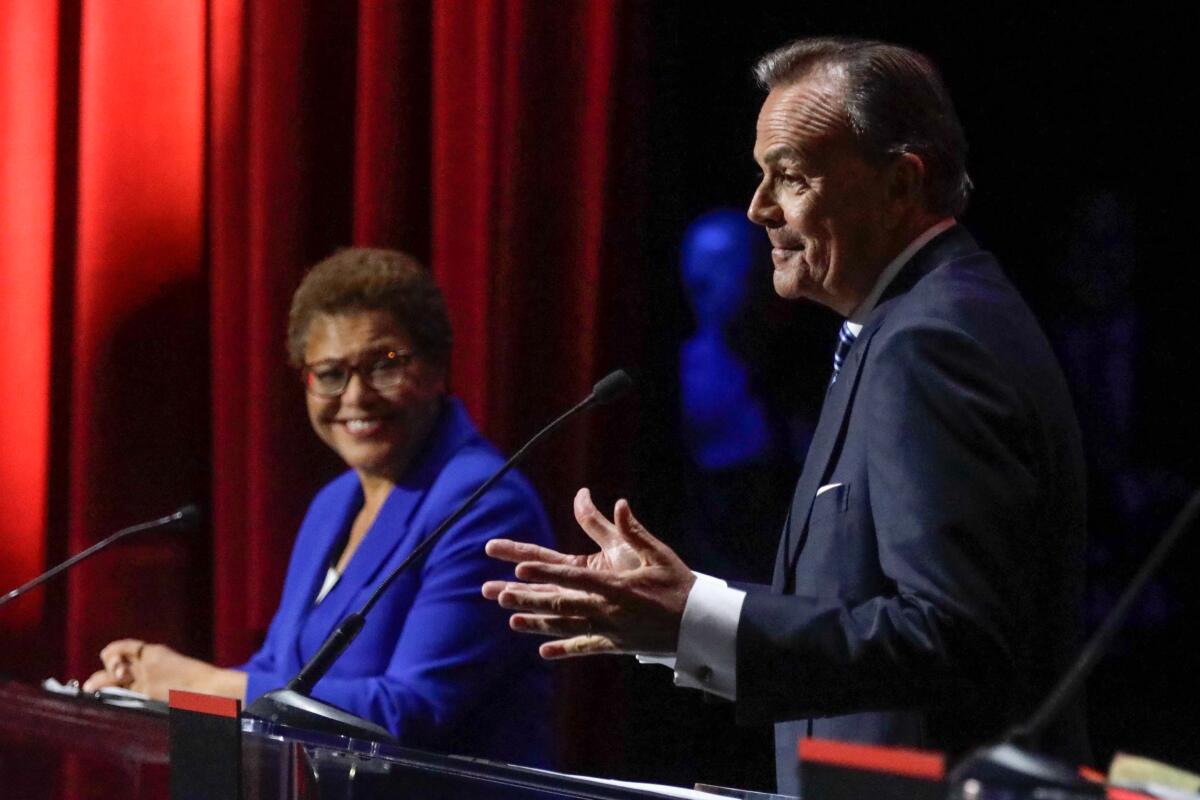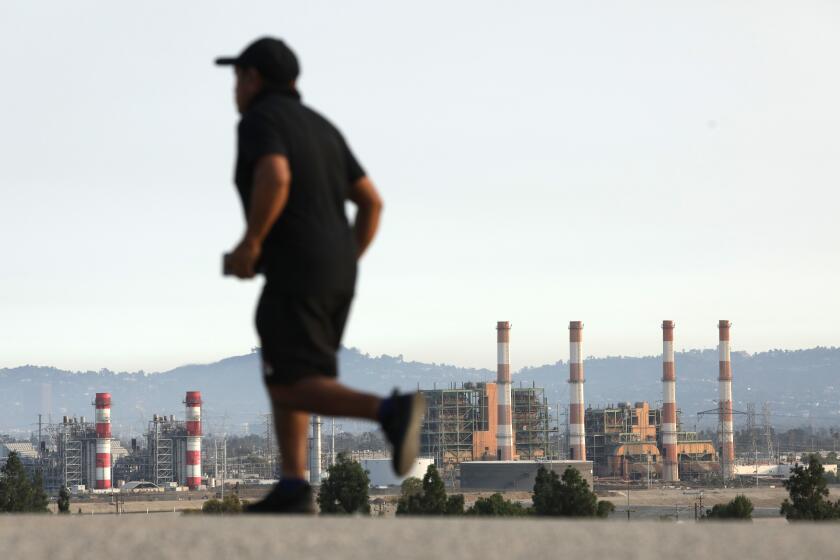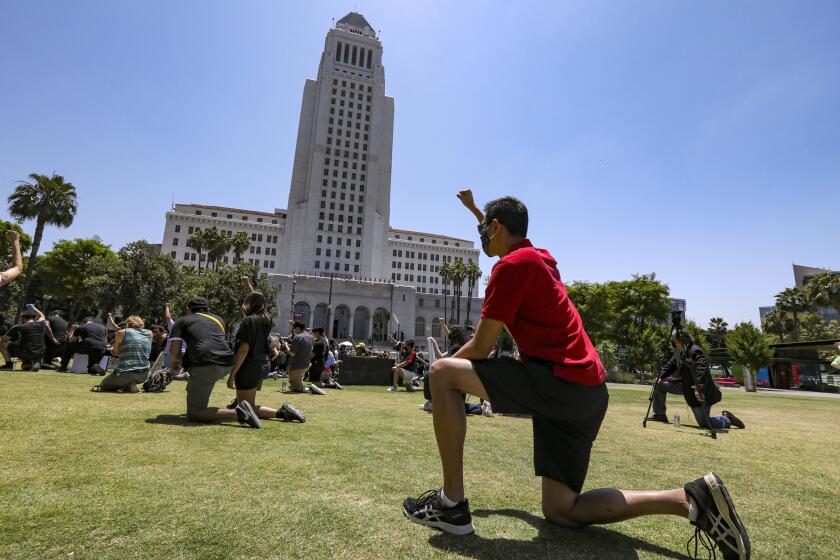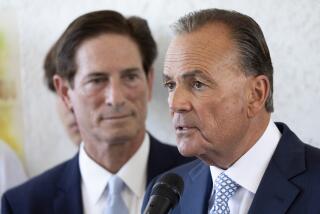Editorial: When big money enters the L.A. mayor’s race

- Share via
Billionaire developer Rick Caruso joined the race to be Los Angeles’ next mayor just eight weeks ago, and with the help of $10 million from his own fortune he’s catapulted into first place.
Though the June 7 primary election is still about two months away, you can’t turn on the television, click on a YouTube video or just surf the internet without being bombarded by ads touting the developer of the Grove and Americana at Brand. Caruso has spent $9 million on advertising so far, which is only slightly less than Eric Garcetti spent for his entire campaign for mayor in 2013, including the primary election and runoff, according to Times reporters Julia Wick and David Zahniser.
Get used to it. The mayoral election is expected to break campaign spending records, with Caruso leading the pack and every other candidate — who can afford to stay in the race — scrambling to keep up.
L.A. is already suffering from the impact of climate change, but candidates for mayor don’t seem to have many new ideas for what to do about it.
Caruso is free to use his wealth however he wants, and there’s no law prohibiting him from pouring money into his mayoral campaign. Still, it’s unsettling to see this kind of money thrown into the race so early to advantage a single candidate.
There have been several recent efforts to level the playing field for less affluent candidates. This year is the first test of Los Angeles’ “supermatch” public financing system in a mayoral election. In 2018, the City Council passed new rules drafted by the Ethics Commission allowing qualified candidates to receive $6 in public funds for every $1 they raise from city residents. L.A. now has one of the most generous public financing systems in the nation.
Ten of the 12 mayoral candidates on the ballot have accepted matching funds. Caruso and businessman Ramit Varma have not. The supermatch is supposed to enable candidates to spend less time wooing wealthy donors or special interests willing to write big checks; the endless fundraising and need to cultivate the rich and powerful turned off a lot of would-be candidates and voters. With more public financing, candidates, in theory, can instead focus on community-level outreach and cultivating small donors, and still raise enough money to run a serious campaign.
In electing a new mayor, voters will also choose a new vision, a new face and a new voice for Los Angeles.
But Caruso’s $10-million loan to his campaign has already vastly outpaced the roughly $1 million that public financing candidates could receive from the city before June 7. His spending prompted the Ethics Commission to lift the $3.3-million expenditure limit for public financing candidates during the primary election. That means Rep. Karen Bass, City Atty. Mike Feuer, Council Members Kevin de León and Joe Buscaino and others can spend as much money as they want now — but they also have to dedicate the time and energy to drumming up more contributions.
Caruso’s campaign staff have said the billionaire’s decision to spend his own money on the campaign is a good thing for Angelenos because it means he’s not raising money from special interests. Caruso’s campaign finance forms have classified his contributions as loans, which means he could eventually raise money from special interests to help cover the costs. On Wednesday, a Caruso spokesman said the candidate does not intend to raise money to repay the loans.
Can Caruso buy his way into City Hall? That’s an open question. The money has helped elevate his standing in polls. When he entered the race in February, about 8% of likely voters said they would pick him, according to a UC Berkeley Institute of Governmental Studies poll co-sponsored by the Los Angeles Times. When the poll was taken again in late March/early April, Caruso had backing from 24% of likely voters, with Bass at 23%. Some 40% of voters remain undecided.
That’s a snapshot in time, and to many Angelenos, the mayoral election has barely begun. Blasting ads across TVs and computer screens is a good way to get voters to start paying attention — if it doesn’t eventually grate on their nerves. But if history is any guide, money isn’t the sole determinant in winning elections in Los Angeles and California. More than one wealthy person — Republican gubernatorial candidates John Cox and Meg Whitman come to mind — has found that betting their millions on winning support of voters in California was a very bad investment.
More to Read
Updates
1:45 p.m. April 13, 2022: This editorial has been updated with a statement from Caruso’s campaign issued Wednesday.
A cure for the common opinion
Get thought-provoking perspectives with our weekly newsletter.
You may occasionally receive promotional content from the Los Angeles Times.












